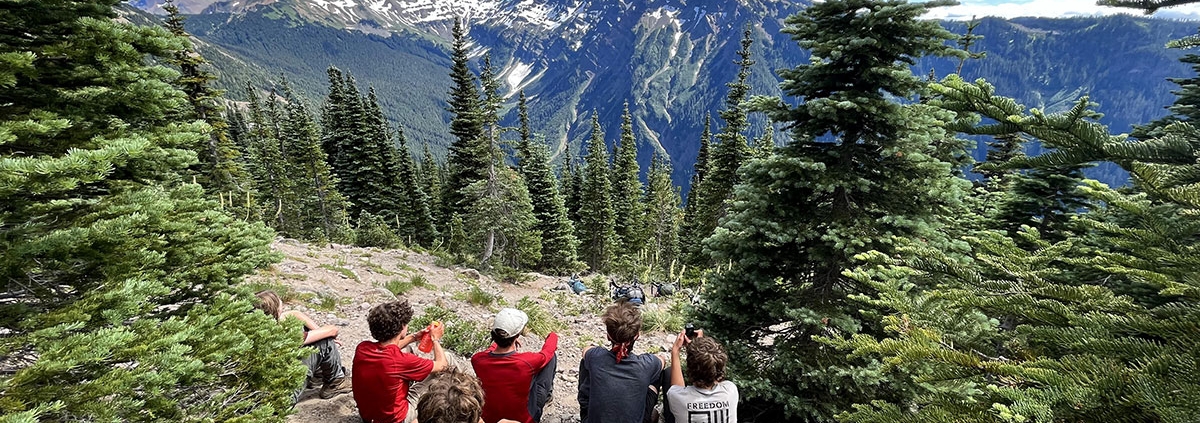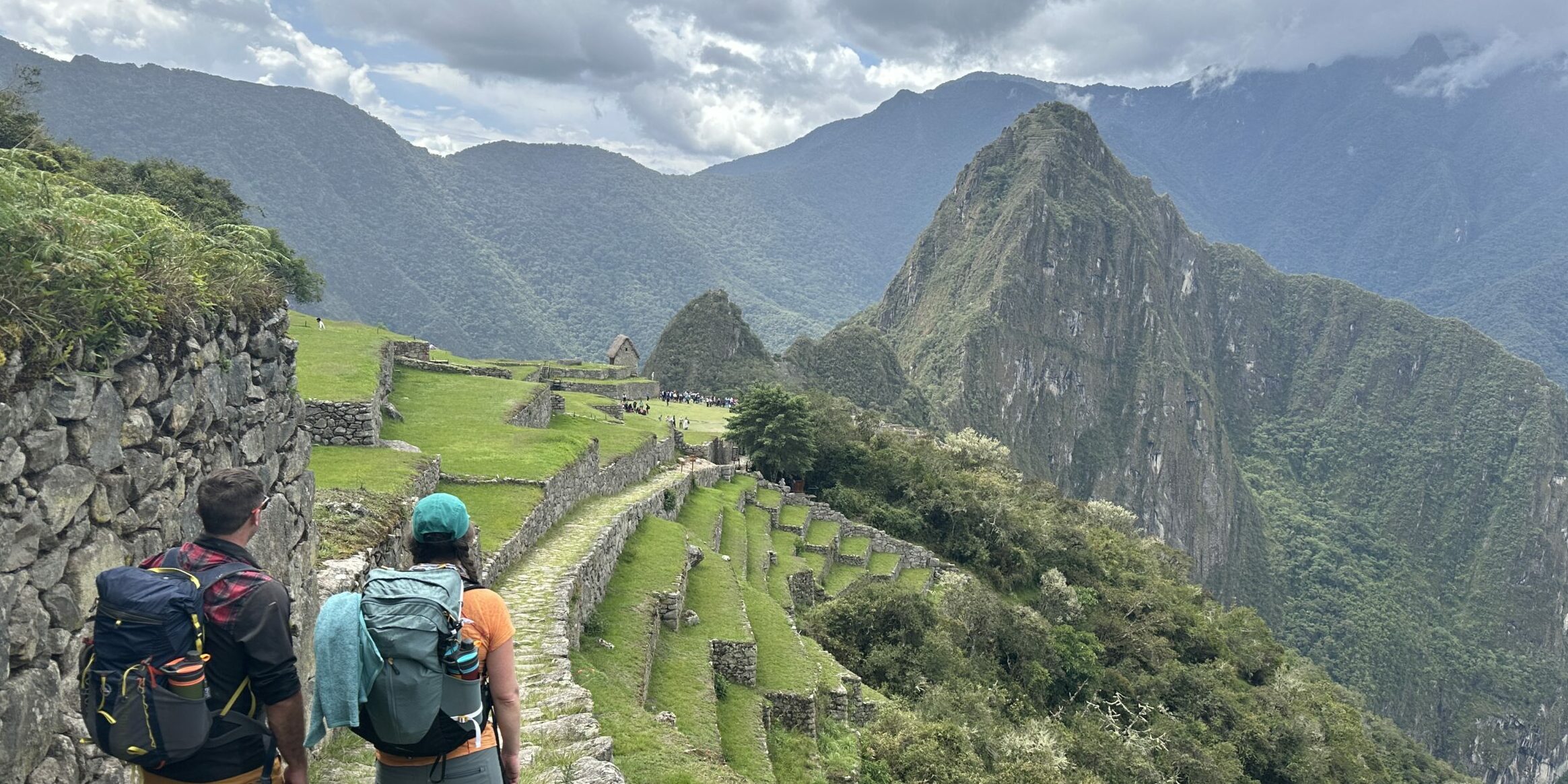The Incredible Power of Experiencing Awe in the Outdoors for Teens
One of the reasons that Adventure Treks travels to beautiful outdoor spaces—and why so many of those landscapes have become designated recreation sites like national parks—is because nature often inspires us to feel awe. Experiencing awe can lead to significant benefits in our lives and communities, especially for teenagers. As an Adventure Treks instructor, I have had the great joy of not only experiencing awe with my students, but also watching them encounter it on their own.
What is awe?
The Cambridge Dictionary defines awe as “a feeling of great respect sometimes mixed with fear or surprise.” The Greater Good Science Center at the University of California, Berkeley has a better working definition (at least, in my opinion):
“Awe is the feeling we get in the presence of something vast that challenges our understanding of the world, like looking up at millions of stars in the night sky or marveling at the birth of a child. When people feel awe, they may use other words to describe the experience, such as wonder, amazement, surprise, or transcendence.”
What does awe feel like? Physically, our expression shifts—our eyes widen and our heads tilt up. Sometimes we smile. Sometimes we remain motionless. Goosebumps or chills are common signs of experiencing awe, and it is not uncommon to cry what some might call “tears of joy”—not from sadness but of course, from awe.
We might feel awe when listening to an orchestra play, stargazing on a clear night, experiencing the change of seasons or a particularly beautiful day, watching children play, spending time with family and friends, meditating or participating in religious practices, and in endless other ways. It is usually related to the feeling of recognizing that there are bigger forces at work than our individual selves.
What awe means to us
Dacher Keltner, a psychology professor at UC Berkeley and co-director of the Greater Good Science Center, has dedicated many experiments to the study of this single emotion. His work has shown that evolutionarily, awe had a hand in shifting individualist ancient peoples into social groups and eventually into growing societies. He found that “awe binds us to social collectives and enables us to act in more collaborative ways that enable strong groups, thus improving our odds for survival.”
Awe still plays an important role in society today. Not only is it a magical feeling, but it inspires us to shift our perspective. When we experience awe, we realize that our annoyances and anxieties are one part of a massive whole of the human experience, and this automatically reframes our minds in a way that makes us more social. For me, this means that whenever I see something beautiful or find awe in an everyday moment, I feel the need to share it. My dad has fielded more than his share of phone calls during which I chatter about a beautiful view on a run, a meaningful moment with my mentee, or the red fox I saw in my yard. Dacher says, “Brief experiences of awe redefine the self in terms of the collective and orient our actions toward the interests of others.”
Awe also makes us curious! The emotion might be mislabeled as wonder or amazement, both of which can be stirred by awe. As it is often a positive emotion, and a connective one, it spurs us to ask questions and be excited in our pursuit of new knowledge. Keltner gives the example of a young child who is perpetually experiencing things larger than themselves (a significant part of the Adventure Treks experience) and completely out of their control (something else we learn at AT). What is their most common phrase? WHY! Just like a toddler, when we experience awe, we want to know more.
Experiencing awe at Adventure Treks
I have had the privilege over many trips to feel awe while simultaneously watching students experience it, so I have seen the immense power of this emotion to connect and inspire young people. The most obvious place to feel awe on an Adventure Treks trip might be during one of our most challenging activities, like a summit attempt: The conditions can be intense, our minds are laser-focused, the camaraderie is strong, and the views are beyond anything we’ve ever seen. I have seen faster and slower students supporting each other through hardship, all parties determined to see the top of the mountain and better understand their place in the world. I have also experienced awe in those “in-between” moments, like playing with freshwater slugs on the banks of a river in California with one of my students. We spent over an hour observing them and their habitat, watching the way they moved and clung to their chosen rocks. There was nothing intense or magical about this moment—we just observed the world and played together.
I encourage everyone to fall into a deep rabbit hole on why waterfalls make us feel good, as standing beneath falling water is another time I have been overjoyed to watch a student experience awe. On their first-ever hike in a forest, they zigzagged from side to side on the trail, taking in every new leaf and salamander and colorful flower. When we arrived at the waterfall that was our destination, this student carefully followed my steps up to the base, then stood, arms outstretched, and let the water fall on their giant smile. They walked back to the vans soaked but curious—why does the water make that sound? How high are the falls? What happens to the water from here? Is this why you’re supposed to pick up dog poop, so it doesn’t end up in the river and fall on me when I stand under the waterfall?
Spending time in nature is one of the best ways to feel awe, and it provides a wonderful backdrop for the myriad of wonders and queries that naturally follow. We at AT are so lucky to get to share some of the most beautiful places in the country and world with our students and encourage them to feel secure and happy in the natural world.
Take the time to pause and open your mind to those things which you do not fully understand. You will be the better for it—and, as your feelings of awe ripple out through acts of kindness, so will the rest of us. – Dacher Keltner


